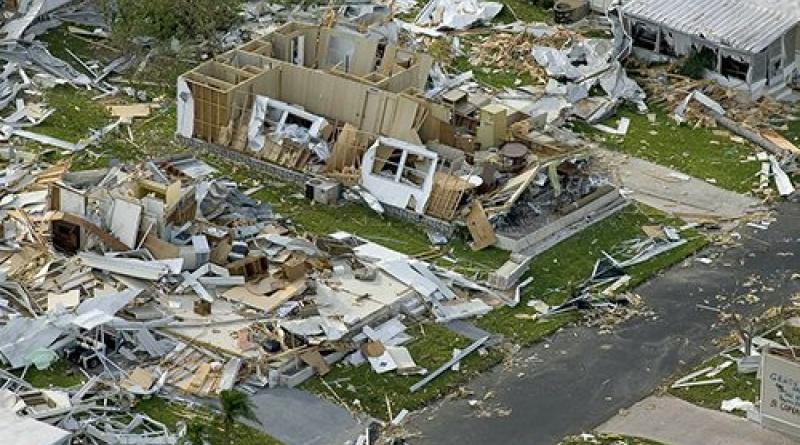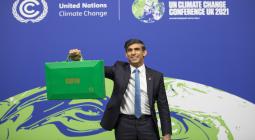Climate Finance Delays Could Produce Devastating 3°C Future, WoodMac Warns

This story includes details on the impacts of climate change that may be difficult for some readers. If you are feeling overwhelmed by this crisis situation here is a list of resources on how to cope with fears and feelings about the scope and pace of the climate crisis.
If big international investors allow “political headwinds” to slow the global energy transition, they’ll be setting up the Earth and its inhabitants for a devastating future of 3°C average warming above pre-industrial levels, concludes an analysis released late last week by the respected Wood Mackenzie energy analytics firm.
WoodMac bases its 3°C projection on average energy transition spending of US$1.7 trillion per year over the next five years, 55% less than the amount required to hit the targets in the 2015 Paris climate agreement.
“With half of the global population heading to polls in 2024, political realities and climate skepticism in the major emitting countries, such as the U.S. and Europe, could reduce the support for the transition as voters seek economic security and price stability,” report author Prakash Sharma, WoodMac’s vice president, scenarios and technologies, said in a release.
The first Global Stocktake that concluded during last year’s COP28 climate summit in Dubai “also confirmed that no major country was on track to meet the Paris-aligned commitments and that strong policy action and capital investment were necessary to accelerate the transition,” Sharma added. Yet “Europe and the UK have already pushed back 2030 climate goals and other countries may follow suit.”
At COP28, countries also committed to triple global renewable energy capacity and double the pace of annual energy efficiency improvements by 2030. But WoodMac still projects global climate pollution exhausting the available carbon budget to stay within a 1.5°C warming limit by 2027, then continuing to rise through 2032.
Already, the release says, higher interest rates and supply chain bottlenecks have increased the cost of renewable energy projects by 10 to 20%. In the consultancy’s “delayed” scenario, “solar and wind dominate power markets in the longer term, but near-term additions are slowed due to transmission bottlenecks,” with utilities turning to unabated fossil fuel plants to balance their grids.
“A slower transition means carbon capture and removal technologies would need to play a dominant role in restoring the carbon balance and achieving long-term climate goals,” WoodMac writes, even though there’s scant evidence those technologies are ready for prime time.
Shifting International Finance
While Wood Mackenzie modelled how a delay in investment would slow down the energy transition, international organizations were looking at how to mobilize financing for the poorest countries on the front lines of the climate emergency. Last week, London, UK-based Stamp Out Poverty published a guide to a Climate Damages Tax on fossil fuel companies, starting at just US$5 per tonne of climate pollution and then increasing by $5 per year, that would raise an estimated $900 billion in loss and damage funding by 2030.
The analysis “demonstrates that the richest, most economically powerful countries, with the greatest historical responsibility for climate change, need look no further than their fossil fuel industries to collect tens of billions a year in extra income by taxing them far more rigorously,” report author and Stamp Out Poverty Director David Hillman told the Guardian. “This is surely the fairest way to boost revenues for the loss and damage fund to ensure that it is sufficiently financed as to be fit for purpose.”
The report proposed allocating $720 billion to international loss and damage finance, while pouring the remaining $180 billion into a “domestic dividend” to support communities in rich countries that are affected by the energy transition, the Guardian says.
“A climate damages tax would be a powerful tool to help achieve both aims: unlocking hundreds of billions of funding for those at the sharp end of the climate crisis while helping accelerate a rapid and just transition away from fossil fuels around the world,” said Areeba Hamid, a joint director at Greenpeace UK, one of the dozens of international climate groups that endorsed the report.
“Extreme weather is claiming lives and causing catastrophic damage around the world,” Hamid added. “While communities that have contributed least to the crisis find themselves on its front lines, and households across Europe struggle with sky-high energy bills, the fossil fuel industry continues to rake in massive profits with no accountability for its historic and ongoing impact on our climate.”
As the Guardian story circulated, a single oil and gas major, Shell, announced it had taken home $7.7 billion in profits in just three months, while fending off a shareholder resolution calling for more effective climate action. The company “recommended shareholders vote against the resolution, saying its current ‘targets and ambitions’ were sufficient,” the Financial Times reported. “In a letter to shareholders that was sent on Thursday, the investors rejected this and warned that meeting the Paris goals was ‘essential to preserve the health of the global economy’.”
Turning Off the Taps
In a separate post for Climate Home News, Teresa Anderson, global climate justice lead for ActionAid International, cited big international banks like Barclays, HSBC, and Citibank (and she might have mentioned the Royal Bank of Canada) that “are pumping billions into fossil fuel expansion, knowing full well that their decisions directly lead to climate chaos and devastating local pollution, particularly for communities in Africa, Asia, and Latin America. At their AGMs they will undoubtedly celebrate their profits, self-congratulate on miniscule policy tweaks, and try to ignore the clamour of climate criticism.”
Last year, research by ActionAid “showed that these banks are financing an astonishing amount of fossil fuel and industrial agriculture activities in the Global South,” she added. That activity is “causing land grabs, deforestation, water and soil pollution, and loss of livelihoods—all compounding the injustice to communities also getting routinely hit by droughts, floods, and cyclones thanks to climate change.”
The big banks have the power to turn off the taps, Anderson wrote, and public funds must also be diverted to clean energy and climate transition investments. “There is growing appetite for climate action,” she said. “But this just isn’t yet matched by willingness to pay for it. Or even to stop profiting from climate destruction.”






